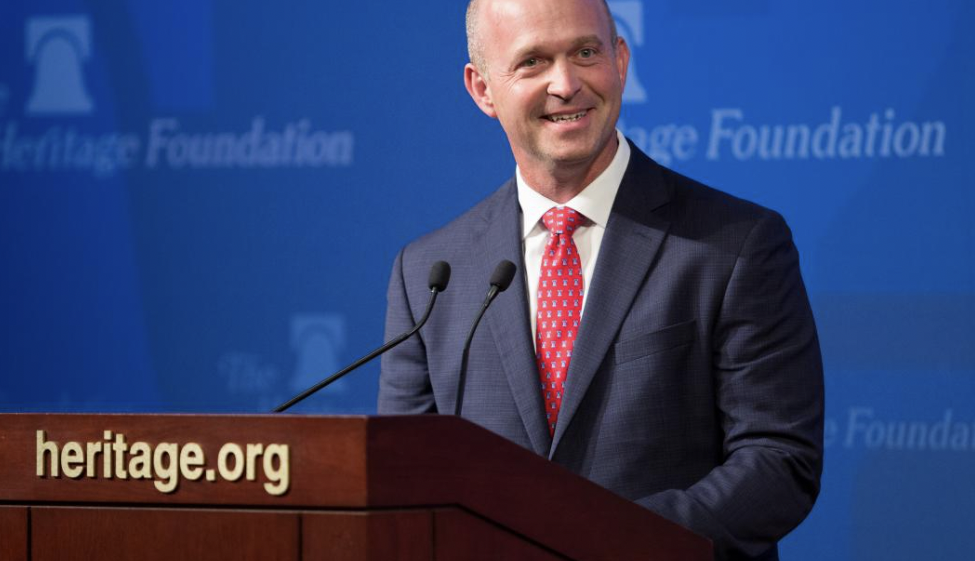
During the quiet months when most of Dartmouth’s campus was away, this Reviewer had the opportunity to spend nearly eight weeks immersed in the political hub of Washington, D.C. Navigating the corridors of power, it became clear that the influence of the Heritage Foundation reverberated through every corner of Republican politics.
In October 2021, Kevin Roberts was appointed as the next president of the Heritage Foundation, a pivotal moment for the think tank. Roberts was previously the president and CEO of The Texas Public Policy Foundation, a Texas-based think tank. The TPPF is known to testify before Congress and be a driving force for policy change. Roberts joined Heritage as they gravitated away from their traditional Reagan-era policy lens and joined the ranks of a new, Trumpian style of politics.
Republican congressional staffers Ed Feulner and Paul Weyrich formed Heritage in 1973 in opposition to mainstream think tanks that were largely liberal. They saw the small number of conservative think tanks that existed at the time as sitting more on the sidelines. Now, Heritage cannot even be classified as sitting outside of the action since they formed the 501(c)(4), Heritage Action for America, in 2010 to accompany their research arm that is a 501(c)(3) that can advocate for the same policies they are researching.
While celebrating Heritage’s 50th anniversary, Roberts addressed the audience, and acknowledged the need for a new approach. He remarked, “Decades of frustration and failure have shown us that the old Washington red team of free marketers, neoconservatives, and evangelicals alone”—the so-called three-legged stool that defined the Reagan-era conservative coalition—”is simply not enough.” Roberts still faces challenges bridging the gap between the traditional Reagan conservatives and the more populist, Trump-aligned faction that has gained prominence within the Republican Party.
This shift within the Heritage Foundation is tangible, going through every facet of conservative politics in D.C. Once a symbol of the Reagan era’s rise, the think tank now embodies the populist movement with former President Donald Trump at its head. This transformation of the Republican Party is perhaps most evident in the promotion of the Heritage Project 2025, an extensive 900-page policy proposal introduced in April 2023. Throughout the summer, Heritage hosted a series of mixers and events aimed at young D.C. conservatives, using these gatherings to further champion Project 2025.
The culmination of this outreach was the July 1 event at Heritage, where the enthusiasm was palpable. The room was packed, with standing room only, as several speakers took the stage to speak on behalf of their organizations and the conservative cause among D.C.’s emerging political talent.
People everywhere were abuzz with the new prospect of being recruited to graduate school or a national conservative organization. But the highlight of the evening was the promotion of Project 2025, which underscored a renewed focus on uniting the next generation of conservatives. Project 2025 is also known as the Presidential Transition Project, which, among its many proposals, would add thousands of staff members that have completed the training attached to the website. This proposal is targeted specifically for young conservative professionals, just like those invited to the event.
In a savvy play, Heritage ensured the crowd was well-fed with Chick-fil-A sandwiches and sodas, a small gesture that went a long way in securing the buy-in of the young interns and staffers. After all, on the small salaries young D.C. staffers are paid, they usually do not say no to a free meal. If nothing else, Heritage demonstrated that they knew how to effectively sell their vision for the future.
Heritage’s presence and messaging have become ubiquitous throughout D.C. Whether it’s at networking events for young interns and staffers or in discussions about Heritage’s projects like Project 2025, the organization has moved beyond the traditional idea that a think tank should operate discreetly in the background, drafting policy proposals. Now they seem to be more in the people business, training those who they can align with their goals and placing them in the best places to achieve them.
This event vividly illustrated that transformation—Heritage has deeply ingrained itself in the fabric of D.C.’s conservative culture, fundamentally reshaping what it means to be a think tank and a driving force for change in the nation’s capital.

Be the first to comment on "Heritage Foundation Attracts Younger Generation With Summer Events"